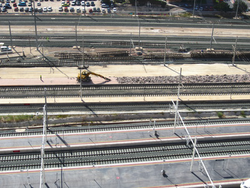Compliance and Regulation Law Glossary

Links : France

Autorité de Régulation des Activités Ferroviaires (ARAF) 57, boulevard Demorieux CS 81915 – 72 019 LE MANS Cedex 2 FRANCE
Phone: + 33 (0)2 43 20 64 30 – Fax. + 33 (0)2 43 24 78 23
Paris office : 3, square Desaix 75015 PARIS FRANCE
Phone : +33 (0)1 58 01 01 10 – Fax. +33 (0)1 45 71 63 51
Go to the website (in French)
Sept. 2, 2015
Sectorial Analysis

Passenger transport markets in Europe have been, and continue to be, liberalised across jurisdictions and sectors.
Since July 2015, passenger coach operators in France have been allowed to operate without regulation on longer routes (over 100km). For shorter routes, ARAFER, the French regulator for rail and roads, will test whether the coach service is likely to threaten the viability of the public rail service offered by SNCF on the same route. What changes could this reform bring, and how might the economic test be applied?

Feb. 12, 2015
Sectorial Analysis

There is no point in counting one by one the powers of a Regulator and add them to try to measure its power. We must measure what consideration the others have of the exercise of its powers it.
So it is with its advice power. Sometimes, in fact, its opinion is worth as much as if it adopted the text itself, as those who read its comments are impressed. Sometimes, the Regulator may have taken a rational opinion, motivated and relevant, those to whom it is addressed don't care.
The result is often that the Regulator takes note of this weakness against which strictly within the framework of this opinion mechanism the regulatory body can do nothing, but in a continuation of powers between the Ex Ante and the Ex post, because the area is an enclosed space, the diverse attitudes will be remembered, especially when the Regulator will be exercising its powers to resolve disputes or its power of sanctions. And there ...
Take the example of railway activities. The French Regulatory Authority of Railway Activities (Autorité de Régulation des Activités Ferroviaires - ARAF )) is a new regulator, in front of powerful actors, where the State has interests. The fact that these interests are legitimate don't remove the weight that such integrated public operator is facing the regulator. On 27 November 2014, ARAF expressed negative opinions about the main draft decrees. January 6, 2015, the Autorité de la Concurrence (French Competition Authority) has also made a critical opinion, including in its discontent and the law of "Railway Reform" and the draft decrees.
February 11, 2015, 7 decrees implementing the February 10, 2015 have been published. Adverse opinion on three of them by the regulator (ARAF) were swept away. We can admit quite, both regarding the Competition Authority opinion, since we are in terms of regulation and not in the simple competition system, and about ARAF opinion because its opinion is only a consultative and executive power remains in line with the will of Parliament. It's almost as if the Regulator had not said a word.
Thus, under the hierarchy of norms, in the letter and in spirit, the decrees are in line with the law they enforce. No blame.
But it is not excluded that the regulator of rail activities can remember of having been so little after, when it must be considered as a kind of judge in civil functions (dispute resolution) and in punitive functions (sanctions) that almost the same will appear before the regulatory body.

Jan. 10, 2015
Sectorial Analysis

